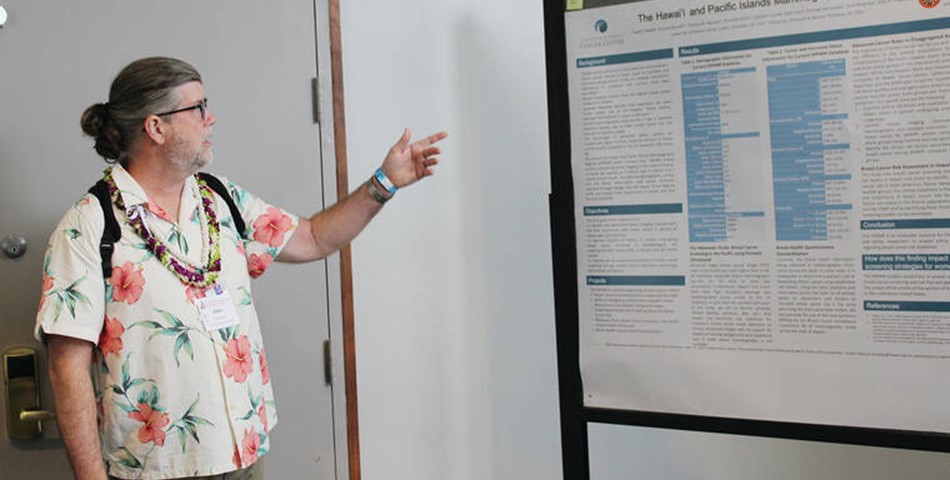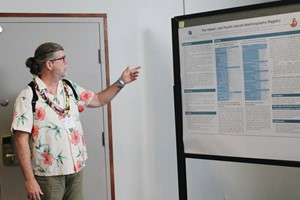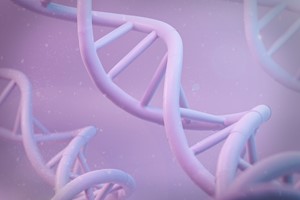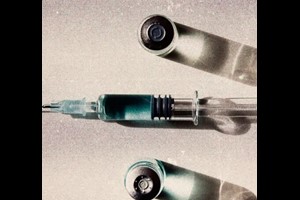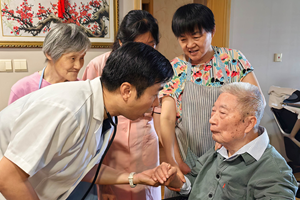Data driven models, artificial intelligence and new technology were topics of conversation at a three-day symposium on breast cancer at the 10th International Breast Density and Cancer Risk Assessment Workshop at King Kamehameha’s Kona Beach Hotel.
Over 100 attendees from 13 countries shared cutting edge technology, new research and important information relating to breast cancer risk factors and the biology of breast density. It was also an opportunity to share this technology and emerging research with the health care community in Kailua-Kona.
John Shepherd, Ph.D., UH Cancer researcher, was the conference organizer and co-chair. He is known for his work in quantitative imaging, particularly biomarkers from medical imaging, using advanced machine-learning techniques.
“Other than age, breast density is the strongest common risk factor for breast cancer,” said Shepherd. “This very successful workshop series is held in Hawaii every two years to explore new findings and concepts that have occurred in this rapidly developing field.”
Breast cancer is the most frequently diagnosed cancer among women in Hawaii. Recently, the Food and Drug Administration updated the Mammography Quality Standards Act to require mammography facilities to inform women about the density of their breasts.
According to the National Cancer Institute, women with dense breasts have a higher risk of breast cancer than women with fatty breasts. The University of Hawaii Cancer Center leads research on breast cancer risk and reducing advanced breast cancer stage rates among unique races and ethnicities in Hawaii and the Pacific using breast imaging. Forty percent of women have dense breasts with Asian women having the highest rate.
Shepherd said Hawaii has a high incidence of breast cancer and it is often caught in late stages which makes treatment more complicated. An average of 155 women die annually in the state because of the disease. Risk assessment is an important factor in early detection but screening access is difficult in rural communities. Because of this Hawaii has a high rate of advanced cancer — 22% versus a national average of 9%.
He said another factor is a shortage of hematology/oncology and radiologists in the state. Currently the John A. Burns School of Medicine does not have a radiology residency or oncology fellowship program. Shepherd said the UH Cancer Center is partnering with the medical school to bring those programs to Hawaii, since there is a better chance that physicians training in the state will stay in the state.
According to the National Cancer Institute, women with dense breasts have a higher risk of breast cancer and have an increased risk that cancer won’t be detected on a mammogram. Because of this, the Food and Drug Administration recently updated the Mammography Quality Standards Act to require mammography facilities to inform women about the density of their breasts.
New technology is leading to better screening with 3D imaging being able to detect abnormalities on dense breasts that traditional mammography would miss.
Another technology just improved by the FDA is Delphinus Medical Technologies 3D Whole Breast Ultrasound Tomography. This new screening tool, specifically for women with dense breasts, does not require compression or radiation with only a 2-3 minute average scan time per breast. Clinical evidence has demonstrated that SoftVue enhances dense breast screening identifying more cancers with greater accuracy and potentially fewer biopsies than full field digital mammography alone. Company representatives hope the new technology will soon be available in Hawaii.
Another tool in the fight against breast cancer the Hawaii and Pacific Island Mammography Registry which is collecting data from different groups of women to determine risk factors.
The higher the risk factor, the more screening needs to be done, which will lead to the diagnosis of more cancers.
UH Cancer Center is looking for volunteers from the Big Island to participate in a study. Those who are 18 years or older, have been diagnosed with early stage cancer (Stage I, II or III) and have completed adjuvant chemotherapy within the past 12 months are asked to email carecoordination@cc.hawaii.edu for more information. For those who are currently receiving treatment for breast cancer email iokado@cc.hawaii.edu to participate in their study to improve cancer care.
Also in development is a portable ultrasound physicians can use. Once a scan is done, AI can then determine if there is a need to consult a radiologist for further screening.
AI is also being used in research on “liquid biopsies.” The promising technology hopes to detect what type of cancer is present through a blood draw.
The researchers and physicians present at the conference are hopeful the screening methods and technology will catch cancers earlier, therefore lowering mortality rates.



